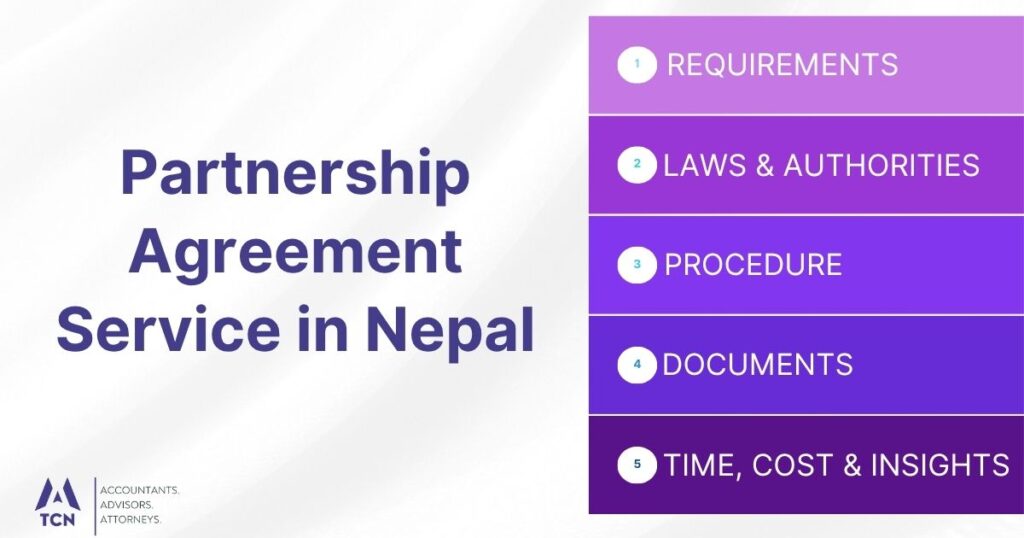Partnership agreements form the foundation of successful business collaborations in Nepal. These legal documents establish clear terms, responsibilities, and profit-sharing arrangements between business partners. TCN and Axion Partners stand as Nepal’s leading providers of comprehensive partnership agreement services, offering expert legal guidance and documentation support for businesses across all sectors.
Understanding Partnership Agreements in Nepal
Partnership agreements serve as legally binding contracts that govern business relationships between two or more parties. In Nepal, these agreements must comply with the Partnership Act, 2020 (2077 BS), which replaced the earlier Partnership Act, 1964. The new legislation provides comprehensive guidelines for partnership formation, operation, and dissolution.
Legal Framework for Partnerships in Nepal
The Partnership Act, 2020 establishes the legal foundation for partnership businesses in Nepal. This act defines partnerships as associations of two or more persons who agree to carry on business together with a view to profit. Key provisions include:
- Minimum Requirements: At least two partners required for formation
- Maximum Limit: No upper limit on number of partners
- Registration Process: Mandatory registration with relevant authorities
- Documentation Standards: Specific requirements for partnership deeds
Types of Partnerships Recognized in Nepal
Nepal’s legal system recognizes several partnership structures, each with distinct characteristics and requirements:
General Partnership
General partnerships involve all partners sharing equal responsibility for business operations, profits, and liabilities. Under Section 15 of the Partnership Act, 2020, all partners possess unlimited liability for business debts and obligations.
Limited Partnership
Limited partnerships combine general partners with limited partners. Limited partners contribute capital but have restricted involvement in daily operations. Their liability remains limited to their capital contribution, as specified in Section 45 of the Partnership Act, 2020.
Limited Liability Partnership (LLP)
LLPs provide partners with protection from personal liability for business debts. The Partnership Act, 2020 introduced comprehensive provisions for LLP formation and operation in Nepal.
Essential Components of Partnership Agreements
Professional partnership agreements must include specific elements to ensure legal compliance and operational clarity. TCN and Axion Partners specialize in drafting comprehensive agreements that address all critical aspects of partnership arrangements.
Fundamental Agreement Elements
Partnership agreements require detailed provisions covering various operational and legal aspects:
- Partner Information: Complete details of all partners including names, addresses, and contributions
- Business Purpose: Clear description of business activities and objectives
- Capital Contributions: Specific amounts and forms of capital each partner contributes
- Profit and Loss Distribution: Detailed formulas for sharing profits and losses
- Management Structure: Roles, responsibilities, and decision-making authority
- Dispute Resolution: Mechanisms for resolving conflicts between partners
Financial Provisions and Capital Structure
Partnership agreements must clearly define financial arrangements and capital requirements. The Partnership Act, 2020 requires transparent documentation of:
Capital Contribution Requirements
Partners must specify their initial capital contributions, including cash, property, or services. Section 22 of the Partnership Act mandates clear documentation of all contributions and their valuations.
Profit and Loss Sharing Mechanisms
Agreements must establish clear formulas for distributing profits and losses. Unless otherwise specified, the Partnership Act, 2020 assumes equal sharing among all partners.
Management and Operational Guidelines
Effective partnership agreements establish clear management structures and operational procedures:
- Decision-Making Authority: Voting rights and consensus requirements
- Daily Operations: Responsibilities for routine business activities
- Financial Management: Banking, accounting, and financial reporting procedures
- Partner Meetings: Frequency and procedures for partnership meetings
Step-by-Step Partnership Agreement Process
Step 1: Initial Consultation and Planning
TCN and Axion Partners begin with comprehensive consultations to understand your business objectives, partner relationships, and specific requirements. Our experts analyze your business model and recommend appropriate partnership structures.
Step 2: Legal Structure Selection
Our legal team helps you choose the most suitable partnership type based on your business needs, liability preferences, and operational requirements. We ensure compliance with the Partnership Act, 2020 and related regulations.
Step 3: Agreement Drafting and Review
Our experienced lawyers draft comprehensive partnership agreements tailored to your specific circumstances. We incorporate all necessary legal provisions while addressing your unique business requirements and partner arrangements.
Step 4: Legal Review and Compliance Check
TCN and Axion Partners conduct thorough legal reviews to ensure complete compliance with Nepalese partnership laws. We verify all provisions meet regulatory requirements and protect your interests effectively.
Step 5: Registration and Implementation
We assist with partnership registration at relevant government offices and ensure proper implementation of your agreement. Our team provides ongoing support for any modifications or updates required.
TCN and Axion Partners: Your Trusted Partnership Agreement Experts
TCN and Axion Partners have established themselves as Nepal’s premier providers of partnership agreement services. Our comprehensive expertise spans legal documentation, regulatory compliance, and business advisory services.
Our Comprehensive Service Portfolio
Our partnership agreement services encompass all aspects of partnership formation and management:
- Legal Documentation: Complete partnership deed preparation and review
- Regulatory Compliance: Ensuring adherence to all applicable laws and regulations
- Business Advisory: Strategic guidance for partnership structures and operations
- Registration Assistance: Support with government registration processes
- Ongoing Support: Continuous assistance for agreement modifications and updates
Specialized Expertise and Experience
TCN and Axion Partners bring extensive experience in partnership law and business formation. Our team includes:
Legal Professionals
Our qualified lawyers possess deep understanding of Nepal’s partnership laws and regulations. They stay updated with latest legal developments and ensure your agreements reflect current requirements.
Business Advisors
Our business consultants provide strategic guidance for partnership structures, helping you optimize your business arrangements for maximum efficiency and profitability.
Compliance Specialists
Our compliance experts ensure your partnership agreements meet all regulatory requirements and maintain ongoing compliance with changing regulations.
Industry-Specific Partnership Solutions
We provide specialized partnership agreement services across various industries:
- Manufacturing Partnerships: Agreements for production and manufacturing ventures
- Service Partnerships: Documentation for professional service collaborations
- Trading Partnerships: Agreements for import/export and trading businesses
- Technology Partnerships: Specialized agreements for IT and technology ventures
- Healthcare Partnerships: Compliance-focused agreements for medical practices
Legal Compliance and Regulatory Requirements
Partnership agreements in Nepal must comply with multiple legal frameworks and regulatory requirements. TCN and Axion Partners ensure comprehensive compliance with all applicable laws.
Partnership Act, 2020 Compliance
The Partnership Act, 2020 establishes mandatory requirements for partnership agreements:
- Registration Requirements: Partnerships must register within 35 days of formation
- Documentation Standards: Specific formats and content requirements for partnership deeds
- Reporting Obligations: Regular reporting requirements to relevant authorities
- Amendment Procedures: Formal processes for modifying partnership agreements
Tax and Financial Compliance
Partnership agreements must address various tax and financial obligations:
Income Tax Considerations
Under the Income Tax Act, 2058, partnerships face specific tax obligations and reporting requirements. Our agreements ensure proper tax planning and compliance structures.
VAT Registration Requirements
Partnerships exceeding specified turnover thresholds must register for Value Added Tax under the VAT Act, 2052. We incorporate necessary provisions for VAT compliance.
Labor and Employment Law Compliance
Partnership agreements involving employees must comply with the Labor Act, 2074. Key considerations include:
- Employment Contracts: Proper documentation of employee relationships
- Social Security: Compliance with Social Security Act requirements
- Worker Safety: Adherence to occupational health and safety regulations
Benefits of Professional Partnership Agreement Services
Engaging professional services for partnership agreements provides numerous advantages for businesses in Nepal. TCN and Axion Partners deliver comprehensive benefits through our expert services.
Legal Protection and Risk Mitigation
Professional partnership agreements provide essential legal protection:
- Liability Limitation: Clear definition of partner liabilities and responsibilities
- Dispute Prevention: Comprehensive provisions for conflict resolution
- Regulatory Compliance: Ensuring adherence to all applicable laws
- Asset Protection: Safeguarding business and personal assets
Operational Efficiency and Clarity
Well-drafted agreements enhance business operations through:
Clear Role Definition
Partnership agreements establish clear roles and responsibilities for each partner, preventing confusion and conflicts in daily operations.
Decision-Making Frameworks
Agreements provide structured decision-making processes, ensuring efficient business operations and timely resolution of issues.
Financial Benefits and Tax Optimization
Professional partnership agreements offer significant financial advantages:
- Tax Efficiency: Optimal tax structures and planning opportunities
- Capital Management: Efficient capital contribution and distribution mechanisms
- Profit Optimization: Strategic profit-sharing arrangements
- Cost Control: Clear expense allocation and management procedures
Frequently Asked Questions
What documents are required for partnership agreement preparation in Nepal?
Required documents include partner identification certificates, business registration certificates, tax clearance certificates, and detailed business plans outlining partnership objectives and operational structures.
How long does the partnership agreement process take in Nepal?
The complete partnership agreement process typically takes 7-15 working days, including consultation, drafting, review, and registration phases, depending on complexity and documentation completeness.
Where should partnerships register their agreements in Nepal?
Partnerships must register at the Office of Company Registrar or relevant local government offices, depending on business type and location, within 35 days of agreement execution.
What are the costs involved in partnership agreement services?
Partnership agreement service costs vary based on complexity, partner numbers, and business type, typically ranging from NPR 25,000 to NPR 100,000 including legal fees and registration charges.
How can partnership agreements be modified or amended in Nepal?
Partnership agreement modifications require written amendments signed by all partners, followed by registration with relevant authorities and compliance with Partnership Act, 2020 amendment procedures.


